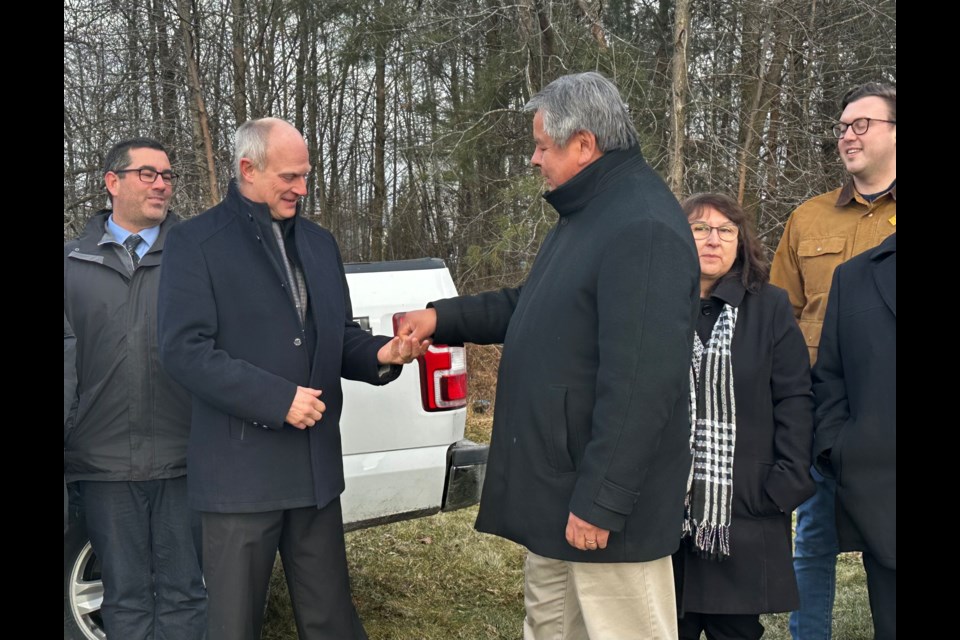The Township of Ramara has completed an unprecedented road transfer to the Chippewas of Rama First Nation, officially moving five area roads under the care of the neighbouring First Nation.
Ownership of Fish Sideroad, Benson Sideroad, Willison Sideroad, Williams Road, and Victoria Park Road was transferred to the First Nation during a ceremonial purchase of the roads Tuesday morning – for a toonie – which Chief Ted Williams presented to Ramara Mayor Basil Clarke Tuesday morning.
The transfer will allow the First Nation to utilize a $2.1 million provincial grant it received for road upgrades, which required ownership of the roads to proceed.
Township and First Nation officials had to “invent” the process for transferring the roads, as it had never been done before, said Clarke.
“I didn't realize how hard it was to give away land,” joked Clarke on the years-long process.
“It’s easy to take it – there’s lots of scripts and rules written on how to take land, (but) bugger all on how to actually sell a road, so we had to invent the process," he said.
“It's never been done before, so really glad that we were able to do that,” he said. “It's certainly better for both our communities.”
Upgrades are planned for Fish Sideroad to allow increased residential traffic, for the intersection of Benson Sideroad and Fish Sideroad to improve sight lines and drainage, and Willison Sideroad, Williams Road, and Victoria Park Road to improve local traffic use.
“I do believe that this is going to lead to future development, future endeavours, where we as a First Nation look to the township on future partnerships. We've got mutual interests at stake here,” said Williams.
Williams said assuming ownership of the roads indicates that the First Nation is a “progressive community.”
“The big benefit, the way I see it, it's not necessarily monetary – it's more an independence that we, as a community, are taking on the responsibilities of road infrastructure (and) development,” he said.
“It all means that we are a progressive community that has the ability to take on these types of responsibilities," Williams said. “We are strong enough. We are progressive enough to take on any development.”
Township of Ramara CAO, Zach Drinkwalter, said that although the roads run through the First Nation, many township residents live in the area, too, and the transfer will prove beneficial to both communities.
“There was some funding available to do work on these roads that we may not have access to, but Rama does, so getting these transferred over into their ownership was very important for the funding to be used on these roads,” he said. “We also have some residents that live on these roads, so it's really going to benefit them as well. It's a win-win to all parties.”
Township winter maintenance will continue on the roads for the remainder of the season, Drinkwalter said.
With the costs of construction on the rise amid inflation in recent years, Rama First Nation CAO, Evelyn Ball, said the First Nation will seek additional government funding for road construction, on top of the original $2.1 million it received several years ago.
“Since that time, with inflation, we know that we're probably around $4 million right now to be able to make those changes,” she said. “We are going to be petitioning the … provincial government again to see if we can get additional funds for the grant.”
Ramara residents who live on the roads are still required to follow planning, building, and other policies and procedures, noted a joint township and First Nation press release, and all service standards, like winter road maintenance, will continue to be maintained.




